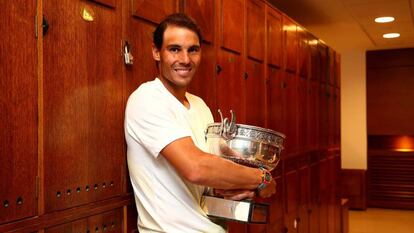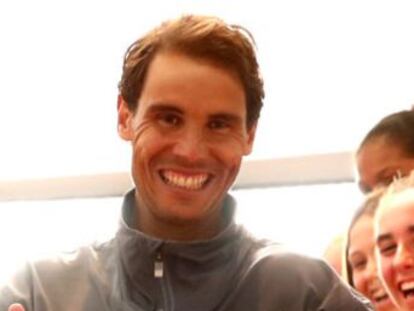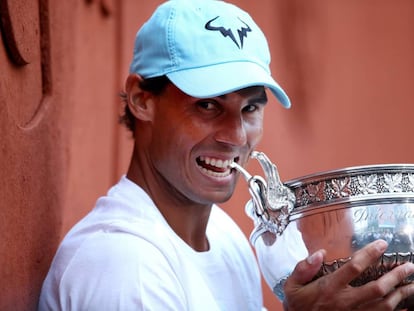Rafa Nadal’s emotional recovery: “I hit rock bottom, I got tired of the pain”
In an interview with EL PAÍS, the new Roland Garros champion confesses that he has been through a darker period than many people might imagine
Rafael Nadal has had a good night’s sleep after winning his 12th French Open in Paris on Sunday. The 33-year-old champion meets with EL PAÍS inside his hotel room, near the Eiffel Tower. His Roland Garros cup is sitting nearby, and he looks happy and relaxed. But this victory comes on the back of a challenging period at both the physical and emotional level – more so than many people imagine.
Question. Honestly, could you see yourself in this situation just a month and a half ago?
Answer. No, but if I’ve forged ahead, it’s because I believed that I could make it to this point; otherwise I would have taken a different road. There are times when you need to make decisions, and everyone knows what has been happening to me over the past 18 months. If, to the knee issue, we add all the extra things that have happened to me, it’s just too many things. You keep moving forward, but there comes a point when you hit rock bottom, because it is frustrating not to be able to train or compete the way you need to in order to be at the necessary level.
After Indian Wells I had a real low point, and there were several alternatives going around inside my head
Q. How bad was the mental block?
A. After Indian Wells I had a real low point, and there were several alternatives going around inside my head. One of them was to stop for a while to see if my body would recover a bit and stop going from injury to injury. The other choice was to forge ahead, but with a different dynamic, because I had entered a spiral of negativity and I couldn’t see the light.
Q. What was the most critical point?
A. I needed to change my thinking, and that’s not something that happens overnight. That night in Barcelona, after defeating Mayer the way I did, I hit rock bottom. That’s when I promised myself that I would adopt the right attitude and energy, and accept the problems in order to compete adequately on the clay tour. For me, playing in Madrid, Barcelona, Rome or Roland Garros is the nicest part of the year, and after making that promise to myself, I made progress. I’ve managed to turn that process into what I wanted, appreciating the small steps I took each day. I took important steps after playing against Thiem in Barcelona, and the definitive step came in Rome.
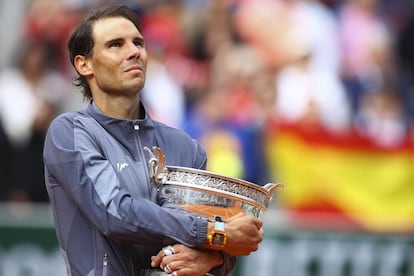
Q. After emerging from all this, do you feel capable of anything?
A. I’ve never viewed myself as capable of everything. I am happy to have achieved something that is very special, and evidently the road that’s been covered was not just so I could stop here, but to keep going. But I need to adjust the agenda and discuss a few things with the team, to try to feel good at the tournaments where I want to feel good, and based on that I’ll try to give myself options at Wimbledon. Afterwards, we’ll see what happens.
Q. Did you ever stop appreciating your achievements?
A. No, not me. I’ve never made that mistake. It’s true that at times, people practically took winning for granted, and that’s dangerous. It’s true that this hasn’t happened for a long time, not since 2015, when that feeling disappeared. I’ve always valued every tournament that I’ve won, although evidently I’ve been more excited about some than others.
We live in a country with different cultures and languages, and for things to work we need to love ourselves as a country
Q. Carlos Moyà, your coach, said he had never seen you so down emotionally. Is that correct?
A. I wasn’t in the right mood, because again I’d had another micro-tear in the knee tendon that required more treatment and rest for three weeks. After that I had to start all over again little by little, feeling pain. I was playing in pain, and that’s a complicated thing. I never got weary of suffering on the tennis court, but there comes a moment when you get tired of suffering constantly. And I am talking about more than sports now, I am talking about real life. Dealing with constant pain is tough. You accumulate pain, pain, pain for many months, and when you recover from one thing you get hit with another... I was emotionally under. I needed to talk to the team and think. I needed to find my inner strength to keep going. I was able to make the right reflection.
Q. At times like that, have you ever felt alone?
A. I have never felt alone anywhere. I have my lifelong friends, the same ones I’ve had since the age of three, and there’s my team, which has hardly changed in all this time. And I also have my family from Manacor, and village life is different from life in the big cities. I am in touch with my family on a daily basis, so I’ve never felt alone. What happens is that, at certain times, what I experience and feel and go through is something that I do all alone, and that is when I need help from the people who love me and know me well. I have always benefited from very good advice and very good company.
Q. This year, you’ve achieved an assertive victory in Paris. What are your takeaways from that?
A. I think I’ve done many things right and almost none wrong. My serves were not incredible, but they were good, and at key moments I scored points with my service. The backhand was very good throughout the tournament, and so was my drive... part of it was the fact that I was able to play for five weeks in a row without retiring. That’s what gives your body confidence, being able to run and move without fear.
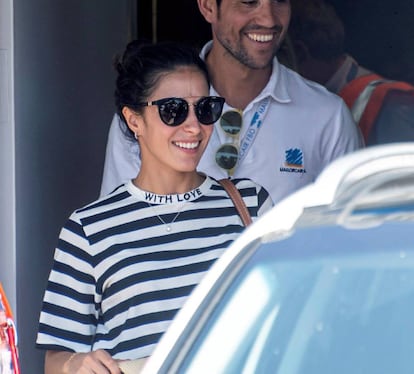
Q. You’ve overcome many difficult situations. How do you manage it?
A. I don’t know… But my view is that not everything is amazing when I win, and not everything is a disaster when I lose. Emotionally, I’m a pretty stable person, with my ups and downs of course, but I’m not the type to get really high or really low. I’m at some middle-of-the-road level that helps me accept the negative and the positive things that happen. The fact of not going emotionally over the top helps me to keep doing positive things, because I am able to preserve a logical, normal mindset. As for sports, rivals and the competition, you go out there knowing that you could win or you could lose. When you accept that, you can deal with everything more adequately.
Q. You say you are ready to face a decline, but are fans prepared to see you not winning one day?
A. I think so. There will always be champions around, or at least I hope so. I suppose they’ll be ready, and if they’re not, they will have to get used to it...It happens to the best in all fields of expertise, and it will happen to me. In my case, there’s been a few times when it looked like that moment was coming, but in the end it did not. I’m still here. But the time will come, and people will accept it just like they accept it with everybody else.
Q. You are getting married this year. How hurt were you that details of the wedding were leaked?
A. Personally I wasn’t hurt at all. But there is a lot of talk about these things. I’ve read that I was really angry about it, and the truth is, I am not... These are things that we try to keep private but end up becoming public. Well, all right then. Ultimately I don’t really care. I have no problem having details of the wedding being publicized. But the thing is, everything tends to turn into a circus. We are used to social media and news organizations publishing things that make no sense and which are not even true, and nobody ever publishes a correction. But it hasn’t given me any headaches.
Q. A year ago, right here in Paris, you made a public call for elections in your home country. Are you satisfied now? How do you see the political situation in Spain?
A. It is a turbulent situation because there’s been several votes in a short space of time. The way I see it, for things to work there has to be some stability, and we have lacked this stability for several reasons. Now there’s been a vote and there’s been a winner, but he [Pedro Sánchez] will need to reach deals, I suppose. What’s required is a general sense of responsibility, to think about Spain and Spaniards rather than about the personal interests of the political parties. In these times that we live in, it’s not about one or two parties, because a lot of new parties have entered the stage and they need to reach mutual deals for everybody’s sake.
Q. You talk about new political forces. Do you feel that Spain is fractured?
A. Extreme positions are not good in life, on either end of the spectrum. I think that the way to make progress in life is mainly through respect and tolerance for what the others have to say. In this sense, we live in a country with different cultures and languages, and in order for things to work we need to love ourselves as a country, with our different lifestyles and ways of seeing things, and to respect one another. We live in a world where everything tends towards unity rather than separation. I don’t think that things are worse now because there are different parties or ideas around. Now, it is possible to reach pacts that were not possible before, because there were just a few ideas around. All that’s required is a sense of responsibility and a forward-looking attitude.
English version by Susana Urra.
Tu suscripción se está usando en otro dispositivo
¿Quieres añadir otro usuario a tu suscripción?
Si continúas leyendo en este dispositivo, no se podrá leer en el otro.
FlechaTu suscripción se está usando en otro dispositivo y solo puedes acceder a EL PAÍS desde un dispositivo a la vez.
Si quieres compartir tu cuenta, cambia tu suscripción a la modalidad Premium, así podrás añadir otro usuario. Cada uno accederá con su propia cuenta de email, lo que os permitirá personalizar vuestra experiencia en EL PAÍS.
¿Tienes una suscripción de empresa? Accede aquí para contratar más cuentas.
En el caso de no saber quién está usando tu cuenta, te recomendamos cambiar tu contraseña aquí.
Si decides continuar compartiendo tu cuenta, este mensaje se mostrará en tu dispositivo y en el de la otra persona que está usando tu cuenta de forma indefinida, afectando a tu experiencia de lectura. Puedes consultar aquí los términos y condiciones de la suscripción digital.
More information
Archived In
Últimas noticias
Most viewed
- Sinaloa Cartel war is taking its toll on Los Chapitos
- Oona Chaplin: ‘I told James Cameron that I was living in a treehouse and starting a permaculture project with a friend’
- Reinhard Genzel, Nobel laureate in physics: ‘One-minute videos will never give you the truth’
- Why the price of coffee has skyrocketed: from Brazilian plantations to specialty coffee houses
- Silver prices are going crazy: This is what’s fueling the rally
